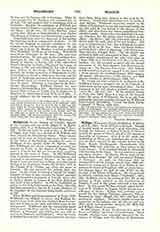

Willibrord, Saint, Bishop of Utrecht, Apostle of the Frisians, and son of St. Hilgis, b. in North-umbria, 658; d. at Echternach, Luxemburg, November 7, 739. Willibrord made his early studies at the Abbey of Ripon near York, as a disciple of St. Wilfrid, and then entered the Benedictine Order. When twenty years old he went to Ireland and spent twelve years in the Abbey of Rathmelsigi (identified by some as Mellifont in Co. Louth) under St. Egbert. From him Willibrord and eleven companions received the mission to Frisia, at the request of Pepin. They came to Utrecht but did not remain there, repairing instead to the court of Pepin. In 692 Willibrord went to Rome, received Apostolic authorization, and returned to his missionary labors. At the wish of Pepin he went a second time to Rome, was consecrated Bishop of the Frisians by Sergius III (November 21, 695) in the Church of St. Cecilia, and given the name of Clement. He also received the pallium from the pope. On his return he labored among the people assigned to him; to raise recruits for future apostolic work he founded a monastery at Utrecht, where also he built a church in honor of the Holy Redeemer and made it his cathedral. In 698 he established an abbey at the Villa Echternach on the Sure; this villa had been presented to him by St. Irmina, daughter of St. Dagobert II, the donation being legally confirmed in 706.
When Radbod gained possession of all Frisia (716) Willibrord was obliged to leave, and Radbod destroyed most of the churches) replaced them by temples and shrines to the idols, and killed many of the missionaries. Willibrord and his companions made trips between the Maas and the Waal, to the North of Brabant, in Thuringia and Geldria, but met with no success in Denmark and Helgoland. After the death of Radbod he returned (719) and repaired the damages done there, being ably assisted in this work by St. Boniface. Numberless conversions were the result of their labors. Willibrord frequently retired to the Abbey of Echternach to provide more particularly for his own soul; he was buried in the oratory of this abbey, and after death was almost immediately honored as a saint. Some relics were distributed in various churches, but the greater part remained at the abbey. On October 19, 1031, the relics were placed in a shrine under the main altar of the new basilica. His feast is celebrated on November 7, but in England, by order of Leo XIII, on November 29 Since his burial Echternach has been a place of pilgrimage, and Alcuin mentions miracles wrought there. The old church was restored in 1862 and consecrated in September, 1868. Another solemn translation of the relics took place on June 4, 1906, from the Church of St. Peter to the new basilica. On this occasion occurred also the annual procession of the holy dancers (see Abbey of Echternach.—The Dancing Procession). Five bishops in full pontificals assisted; engaged in the dance were 2 Swiss guards, 16 standard-bearers, 3045 singers, 136 priests, 426 musicians, 15,085 dancers, and 2032 players (Studien u. Mittheilungen, 1906, 551).
No writing can with certainty be attributed to St. Willibrord except a marginal note in the Calendar of Echternach giving some chronological data. On his testament or last will, which is probably genuine, see “Acta SS.”, III November, 631. In the national library of Paris (No. 9389) there is a copy of the Gospels under the name of Willibrord; this is an old Irish manuscript and was probably brought by Willibrord from Ireland (Bellesheim, “Gesch. der kath. Kirche in Irland”, I, Mainz, 1890, 623).
FRANCIS MERSHMAN

